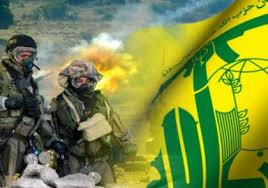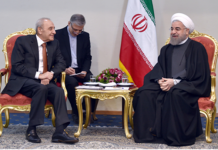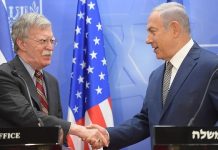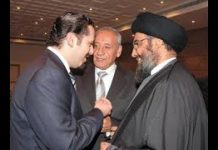Axis of Resistance Missiles and Encrypted Messages
Sam Menassa/Asharq Al Awsat/April 17/2023
صواريخ الممانعة والرسائل المشفرة
سام منسى/الشرق الأوسط/17 نيسان/2023
إطلاق الصواريخ من جنوب لبنان على إسرائيل في 7 أبريل (نيسان) الحالي ليس هو الحدث الذي يستأهل الاهتمام الذي حصده، على الرغم من أنه الحادث الأخطر منذ حرب عام 2006. فإطلاق الصواريخ من الجنوب وردّ إسرائيل عليها يعود إلى سبعينات القرن الماضي عندما وقّع لبنان اتفاق القاهرة عام 1969، سامحاً بذلك للمنظمات الفلسطينية المسلحة النظامية وغيرها من مسلحين وميليشيات فلسطينية وأخرى تابعة لسوريا والعراق وليبيا استباحة أرض الجنوب اللبناني. هذا الحدث ليس بالجديد إذن، وهو نتيجة عدم وجود دولة، أو حكومة، ما جعل استباحة السيادة اللبنانية من جانبي الحدود أمراً عادياً، أقصى ما يستتبعها هو صيحات استنكار لبنانية من هنا وهناك، لا تلبث أن تخبو، تخترقها شكاوى رسمية إلى مجلس الأمن خاوية من المنطق، تطالب باحترام القرارات الدولية، وعلى رأسها القرار 1701. في الوقت الذي تعرف فيه الدولة اللبنانية وحكومتها وسياسيوها كافة أنه لا مسوغ للشكوى، لأن القرار لم يطبق يوماً من جانبها، والسلاح الفلسطيني كما سلاح «حزب الله» متفلت في الجنوب، من دون حسيب أو رقيب، رغم وجود القوات الدولية والجيش اللبناني.
المهم في حادثة إطلاق الصواريخ هي المعاني والدلالات المستخلصة التي تتجاوز البعد اللبناني الداخلي لتطول المناخ السياسي في المنطقة، بعد الاتفاق السعودي الإيراني. بالمباشر، هي تشير إلى فهم إيران وحلفائها وأدواتها السياسية والأمنية في دول ومناطق نفوذها لمفاعيل هذا الاتفاق، وعلى رأسهم أقوى أذرعها وميليشياتها، أي «حزب الله»، الذي باعتراف أمينه العام يعتبر جزءاً لا يتجزأ من منظومة إيران الأمنية خارج حدودها، ويأتمر بأوامرها. الحديث عن سيطرة الحزب على لبنان بعامة، وعلى مناطق قواعده الشعبية، وخصوصاً الحدودية منها، هو تأكيد المؤكد، وعليه يصعب بل يستحيل إطلاق هذا العدد من الصواريخ باتجاه إسرائيل من منطقة نفوذه الرئيسة من دون علمه. لا يختلف اثنان أن ما جرى حصل بموافقة الحزب وبركته، وتالياً بموافقة وبركة راعيه الرئيس طهران، ما يدفعنا للاستنتاج أن ثوابت السياسة الإيرانية في المنطقة منذ وصول الملالي إلى الحكم سنة 1979 قائمة على مبدأين…
المبدأ الأول هو عدم المواجهة المباشرة والسيطرة عبر وكلاء. أرست إيران نفوذها في بعض دول المنطقة عبر حلفاء من البيئات المحلية من صلب النسيج الوطني لهذه الدول، وهو على ما هو عليه من تفكك، وهم قوى وطنية مستقلة صديقة، تقول إنها حرة في قراراتها. هذا المبدأ أتاح لإيران تمرير ذريعة التبرؤ من ممارسات الحلفاء، مدعية التزامها الاتفاقات التي عقدتها بشكل كامل. «حزب الله» يحاكي سياسة الإنكار المعقول هذه التي تنتهجها إيران، ونفيه معرفته بعملية إطلاق الصواريخ يدخل في صلب سياسة الازدواجية التي يمارسها في لبنان على الصعد كافة وميّزت مسيرته منذ 40 سنة، وتقوم على القيادة من الخلف، أي الإمساك بالقرار دون تحمل تداعياته ومسؤوليته. الحزب يتمسك باتفاق ترسيم الحدود البحرية مع إسرائيل لمصلحة البلدين معاً، والفوائد التي سيجنيها عبره، لكنه في الوقت نفسه ملتزم التضامن والدعم السياسي والأمني والعسكري لحركة «حماس» ومحور الممانعة تطبيقاً للمبدأ الذي أطلق عليه مسمى «وحدة الساحات». يعتمد الحزب الأسلوب والسياسة عينها في الداخل اللبناني، فتراه يدعو إلى الحوار والتفاهم كما يفهمهما بغية جني الحصاد الناتج عنهما من تعافي اقتصادي والإفادة الكاملة من أجواء التهدئة ومهادنة دول الخليج والانخراط ولو كلامياً بمشروعات الإصلاح والانتفاع من المساعدات العربية إذا وصلت، من دون أن يسقط فعلياً حرفاً واحداً من قاموسه.
المبدأ الثاني هو استخدام القضية الفلسطينية كحصان طروادة لتعزيز نفوذها في المنطقة من دون أن نحسم الجدل بشأن صدقية حكامها إزاء هموم الفلسطينيين من عدمه. تبنت طهران شعار كثير من الأنظمة العربية البائدة «لا صوت يعلو على صوت المعركة»، واعتبرت أن حلّ القضية الفلسطينية يكمن بحذف إسرائيل من خريطة الشرق الأوسط بالعمل العسكري المقاوم، وخونت كل من يغرد خارج تعريفها للمقاومة ضد إسرائيل. اليوم، تحاول إيران إعادة البريق إلى توظيفها الموضوع الفلسطيني، وهي بالأساس رافضة للاتفاقات الإبراهيمية ومسار التطبيع وتعتبرها موجهة ضدها وتسعى قدر المستطاع إلى تجميدها والحد من توسعها والقضاء على الحلم الإسرائيلي بإنشاء جبهة إقليمية ضدها. حادثة الصواريخ وما سبقها وتلاها تؤكد وتبين أن الصواريخ تطوّق إسرائيل من 5 جبهات دفعة واحدة؛ لبنان، الضفة الغربية، غزة، الجولان، داخل تل أبيب خصوصاً. إنها رسالة إيرانية واضحة للإسرائيليين لا لبس فيها، تأتي في وقت تعتقد فيه طهران أن إسرائيل ضعيفة ومنهكة بسبب أحوال الداخل. الرسالة تحذيرية، لكبح جماح أي عمل قد يندفع إليه بنيامين نتنياهو ضد طهران بسبب نشاطها النووي، أو هرباً من أزمات الداخل أو الاثنين معاً. ومن دون أن نستبعد اعتبارها في إطار الرد على العمليات الإسرائيلية في الداخل الإيراني أو سوريا.
ومن البديهي أن تكون التوترات المستجدة مع إسرائيل على الجبهات، كما تركيبة الحكومة الإسرائيلية المتطرفة التي اعتمدت مبدأ «حق الشعب اليهودي الحصري وغير القابل للمساومة في جميع أجزاء أرض إسرائيل» ومحاولاتها سن قوانين عنصرية وممارساتها الوحشية ضد الفلسطينيين، كلها تصب لصالح إيران وتقدم لها الحجج لتمددها وتدخلاتها. مختصر الصورة؛ أن نتنياهو الهارب إلى الخارج من أزماته الداخلية، كما هو الحال مع إيران، يتبادلان تقديم الخدمات، بعضهما لبعض، ولو عن غير قصد.
في غياب التوازن الإقليمي والتفكك الذي أصاب معظم دول المشرق العربية، تعيش المنطقة راهناً على وقع حرب الظل بين إسرائيل وإيران. أول ما يتبادر إلى الذهن هو؛ عن أي إسرائيل نتكلم؟ إسرائيل نتنياهو، أم إيتمار بن غفير وبتسلئيل سمورتيتش، أم يائير لبيد وبني غانتس، أم باختصار شديد تل أبيب أو القدس، وهذه أهم الإشكاليات في هذه المرحلة. مهما تكن الأجوبة، لا شك أن إسرائيل غادرت مقعدها الخلفي في مواجهة تهديد إيران النووية، وباتت تعتمد معادلة جديدة تقوم على استهداف إيران بشكل مباشر، لا أذرعها فقط. من جهة أخرى، إذا أراد نتنياهو توسيع اتفاقيات إبراهيم، فذلك يتطلب إدارة ذكية منفتحة للمسألة الفلسطينية، وهو ما يرفضه أو قد يعجز عنه بعد تحالفاته المجنونة مع متطرفين يبدو أن لديهم أجندة مختلفة قد تشكل عبئاً إضافياً لنتنياهو، فهم يطرحون قضية القيم المشتركة التي كانت وستظل الركيزة الأساسية للعلاقة بين واشنطن وتل أبيب.
أما في الجانب الإيراني فمن غير المتوقع أن تغيّر طهران وضعها بين ليلة وضحاها، إنما يتطلب ذلك وقتاً، وطهران خبيرة في الرهان على الزمن وما قد يحمله من متغيرات. لم يزل الوقت مبكراً للتنبؤ بمسار الأمور، لكن بالمقارنة بين حادثة الصواريخ اللبنانية والمحادثات التي شهدتها اليمن بين وفد سعودي – عُماني والحوثيين في صنعاء وما تلاها من إعلان الخارجية الإيرانية عن أملها أن «تساعد المتغيرات التي تشهدها المنطقة على وقف إطلاق النار باليمن بشكل مستمر تمهيداً لمسيرة سياسية مستدامة» ونجاح عملية تبادل مئات الأسرى بين الحوثيين والحكومة اليمنية، يبدو أن المشرق بعامة ولبنان بخاصة سيبقى راهناً على المقعد الخلفي، ولن تصيبه قريباً رياح التغيير التوافقية التي تعم المنطقة.
Axis of Resistance Missiles and Encrypted Messages
Sam Menassa/Asharq Al Awsat/April 17/2023
Although it was the most serious incident since the 2006 war, the April 7 missile attack on Israel from South Lebanon did not warrant the attention it garnered. Missiles have been being fired at Israel, and it has been retaliating, since the 1970s, after Lebanon signed the Cairo Agreement of 1969 that allowed formally recognized armed Palestinian factions, as well as other Palestinian militants and militias loyal to Syria, Iraq and Libya, to operate as they pleased in South Lebanon.
This is not a novel development then. Indeed, violating the sovereignty of Lebanon, from both sides of the border, is the natural outcome of lacking a state or government. The most severe ramifications are denunciations yelled out from here or there that swiftly subside, and hollow demands for respecting international resolutions, especially Resolution 1701. Meanwhile, the Lebanese state and government, as well as all the country’s politicians, know that we have no grounds for making complaints, as Lebanon never implemented it. Palestinian groups and Hezbollah have unfettered access to arms in the South, where no one has the authority to question them or hold them accountable despite the presence of forces from UNIFIL and the Lebanese army.
What is important about the attack is what it means and suggests about the political climate in the region following the Saudi-Iranian agreement. A straightforward conclusion is that the attack indicates that Iran, as well as its allies and proxies in the region, understand the implications of this agreement. No one understands them better than its most potent proxy and militia, Hezbollah. Its Secretary-General openly admits that the party takes orders from Iran and is an integral part of its regional security infrastructure.
It is patently obvious that Hezbollah controls Lebanon in general and its strongholds in particular, especially those close to the border. Thus, it would be difficult, if not impossible, to launch so many missiles toward Israel from its southern strongholds without the party knowing about it. No one disagrees that Hezbollah, and by extension its primary sponsor Tehran, approved the attack. This leads us to conclude that the pillars Iran has built its regional policy on since the mullahs came to power in 1979 are founded on two principles.
The first principle is avoiding direct confrontation and exerting control through proxies. Iran has consolidated its influence in some regional countries through alliances with local communities at the heart of their national fabric. As they tear the national fabric apart, these factions claim to be independent patriotic forces that make their decisions freely. Following this doctrine has allowed Iran to claim it is innocent of the actions of its proxies and that it complies fully with the agreements it has concluded.
Hezbollah has emulated Iran’s pursuit of plausible deniability. Denying its knowledge of the recent attack is consistent with its policy of leading from behind, which has shaped its course for the past 40 years. This tactic allows Hezbollah to call the shots without being held accountable for the implications.
While the party claims to abide by the maritime border demarcation agreement with Israel, which benefits both countries, and it is keen on benefiting from the agreement, it is simultaneously committed to providing political, security and military support for Hamas and the Axis of Resistance, thereby “uniting the arenas of battle.”
The party adopts the same method for managing domestic politics. Hezbollah calls for dialogue and compromise (as it sees fit) to reap the economic fruits it brings. It also seeks to make use of the attempts to appease the Gulf countries by rhetorically committing to reform, as it is determined to benefit from Arab aid if it arrives without actually changing anything.
The second principle is exploiting the Palestinian cause, which it renders a Trojan horse that consolidates its influence in the region without ending the debate around how genuine they are in their concern for the Palestinians. Tehran adopted the slogan that had been raised by many Arab regimes, “no cry is louder than the cry of battle.” It considers the solution to the Palestinian question is removing Israel from the map of the Middle East through military resistance, portraying anyone who does not share its definition of resistance against Israel as a traitor.
Today, Iran is trying to rekindle its exploitation of the Palestinian cause. It rejects the Abrahamic Accords and the course of normalization in principle. It sees them as a threat and has done all that it can to freeze them, limit their spread, and end Israel’s dream of establishing a regional front against it. The recent incident, as well as the developments that preceded and followed it, affirm that Israel has missiles from 5 fronts pointed at it: Lebanon, the West Bank, Gaza, the Golan Heights, and especially within Tel Aviv.
The Iranians have sent Israel a clear message, and it comes at a time when Tehran believes that Israel is weak and drained by domestic challenges. Iran is warning Israel and Netanyahu against rushing to launch attacks on Tehran because of its nuclear activity or to avoid its domestic crisis. We should keep in mind that the attack also comes within the framework of retaliating to Israeli operations in Iran or Syria.
It is clear that the emerging tensions on Israel’s borders benefit Iran, as does the fanaticism of the current Israeli government, which believes in “the exclusive and inalienable right of the Jewish people to all the territory of Israel.” Indeed, the Israeli government’s attempts at passing racist legislation and the brutality with which it treats Palestinians strengthen Iran’s arguments for expansion and interventions. In a sentence: Both Netanyahu and Iran are trying to evade their domestic crisis, and they mutually empower one another, though without intending to.
Amid the imbalance in the region and the disintegration of most of the countries of the Arab Levant, it is currently embroiled in the shadow war between Israel and Iran. The first thing that comes to mind is: Which Israel are we talking about? The Israel of Netanyahu, Itamar Ben Gvir, and Bezalel Smortic, or the Israel of Yair Lapid and Benny Gantz; in a nutshell, Tel Aviv or Jerusalem? These are the most consequential questions at this point.
Regardless of the answers, Israel is no longer in the back seat of the attempt to neutralize the threat of nuclear Iran. It has adopted a new formula, targeting Iran directly, not just its proxies. On the other hand, if Netanyahu wants new countries to join the Abraham Accords, he has to manage the Palestinian issue intelligently. However, he is unwilling or (after his crazy alliance with extremists who seem to have a divergent agenda that could add to his burdens) perhaps unable to do so. Indeed, his allies have put into question Israel’s commitment to the shared values that have been and will remain the pillar of the close relationship between Washington and Tel Aviv.
Regarding Iran, we should not expect Tehran to recalibrate overnight. This process needs time, and Tehran has mastered the art of biding its time in anticipation of developments that change things. Predictions of the trajectory this course will take are premature. On the other hand, the talks in Sanaa between a Saudi-Omani delegation and the Houthis, as well as the statement by the Iranian Foreign Ministry that followed, paint a very different picture. Indeed, the Iranian Foreign Ministry said it hopes that “the changes in the region will facilitate the persistence of the ceasefire in Yemen until a sustainable political solution is reached, while the Houthis and the Yemeni government exchanged hundreds of prisoners. Sadly, it seems that the Levant in general and Lebanon in particular will remain in the back seat; the winds of change that are sweeping the region will not arrive anytime soon.






















